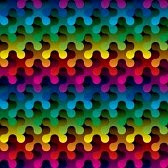The Systems Thinking about ‘Complex’ vs.‘Complicated’
 The concept labeled ‘complicated’ is often confused with the concept labeled 'complex.' From dictionary, ‘complicated’ is difficult to understand. Complex is not simple, which is composed of various elements and intertwined and interdependent. What’s the further Systems Thinking about complex system and complicated system?
The concept labeled ‘complicated’ is often confused with the concept labeled 'complex.' From dictionary, ‘complicated’ is difficult to understand. Complex is not simple, which is composed of various elements and intertwined and interdependent. What’s the further Systems Thinking about complex system and complicated system?
Complicated systems can be simplified and produce predictable outcomes; but Complex systems has a lot of interdependent relationship, hard to predict. Complicated systems produce predictable outcomes once the starting conditions are defined, even though there are many components and relationships. The elements behave the same way each time activities are set in motion. Complex systems, conversely, will produce differing outcomes although the starting conditions are also defined. Complex systems adjust to multiple stimuli, and contain a large number of components, interdependencies, and diverse elements. These aspects behave differently depending on system influences. So Complication can be simplified, there are lots of components, lots of integration, but from a distant, something that can be disassembled or decomposed, and reassembled or recomposed fairly, logically or mechanically. And it will take time and will need expertise, but fundamentally, it is a sequence of lego blocks. Complexity is like mayonnaise, it does not matter how you slice and dice it, it remains mayonnaise. Until you put it through a very different chemical and heating process which unfortunately will not produce the eggs, salt etc that mayonnaise is made from. But will produce more basic or different things like sodium, chlorine, carbon etc. And you won't be able to put that "stuff" back together as mayonnaise without another very different process and a lot of help from "nature."
Both are challenges to management, but each has its own implications and potential results. The idea of complexity is often confused with the term complication. Complicated systems have many interacting parts, but operate in predictable ways. Their functions can be measured and studied to discern patterns that will assist in solving problems and facilitate decision making that produces reliable outcomes. Difficulties can be reduced to simplify solutions. For example, implementing process control practices will be complicated, but the dynamics and mathematics are well understood. The outcomes will therefore follow recognizable patterns that will assist in reducing process variability. Efficiencies will be gained because closeness to standards can be maintained. On the other hand, complexity has emergent properties that make operating patterns less predictable because interactions are continually changing. The factors that create such uncertainty are large due to quantity, interdependence, and diversity of components and relationships. So the system is not only complicated, but has interdependencies that may not be continually connected. These elements may modify their associations as conditions change. In addition, the relationship between elements may not display a lot of homogeneity. The components are diverse in their make-up and behavior. Each may or may not contain the ability to control its actions and may be dependent under one set of conditions and not under another. For example, automatic control systems are designed to continually adjust as inputs and components change in relationship to one another.
 Complexity provides basic explanations of concerning the behavior of complex systems - self-organization, emergence, pattern formation and systems theory. More Systems theory is studying real systems, like societies, nature, psychology - using Systems Thinking, Business Dynamics. Analyzing complex systems using conventional tools can be difficult because these methods assume that observations are independent and that it is possible to extrapolate from averages or medians to the entire population. But because of interconnectivity and the many potential options in a complex system, a small effect one place can cause a cascade of events that produce deceptive output measures that are highly variable; thus producing averages that can be misleading as indicators. Knowing which outliers to exclude can be a challenging call creating questionable models. This is often a problem when trying to predict human behavior before an election or when launching a new product. The feelings, relationships, and influences are complex, and can be misread.
Complexity provides basic explanations of concerning the behavior of complex systems - self-organization, emergence, pattern formation and systems theory. More Systems theory is studying real systems, like societies, nature, psychology - using Systems Thinking, Business Dynamics. Analyzing complex systems using conventional tools can be difficult because these methods assume that observations are independent and that it is possible to extrapolate from averages or medians to the entire population. But because of interconnectivity and the many potential options in a complex system, a small effect one place can cause a cascade of events that produce deceptive output measures that are highly variable; thus producing averages that can be misleading as indicators. Knowing which outliers to exclude can be a challenging call creating questionable models. This is often a problem when trying to predict human behavior before an election or when launching a new product. The feelings, relationships, and influences are complex, and can be misread.
Systems Thinking seeks to define an ideal culture, and then define strategies to “close the gap.” Complexity works with the evolutionary potential of the present, it seeks to understand the “now,” find out what can be changed in a measurable way, and then take small evolutionary steps in a more positive direction without any assumption of the end destination. From management perspective, it’s important to simplify complicated things, and manage complexity accordingly. As Systems Thinking guru Russell Ackoff, said: "Managers are not confronted with problems that are independent of each other, but with dynamic situations that consist of complex systems of changing problems that interact with each other.”
Follow us at: @Pearl_Zhu
Published on May 30, 2015 23:57
No comments have been added yet.



